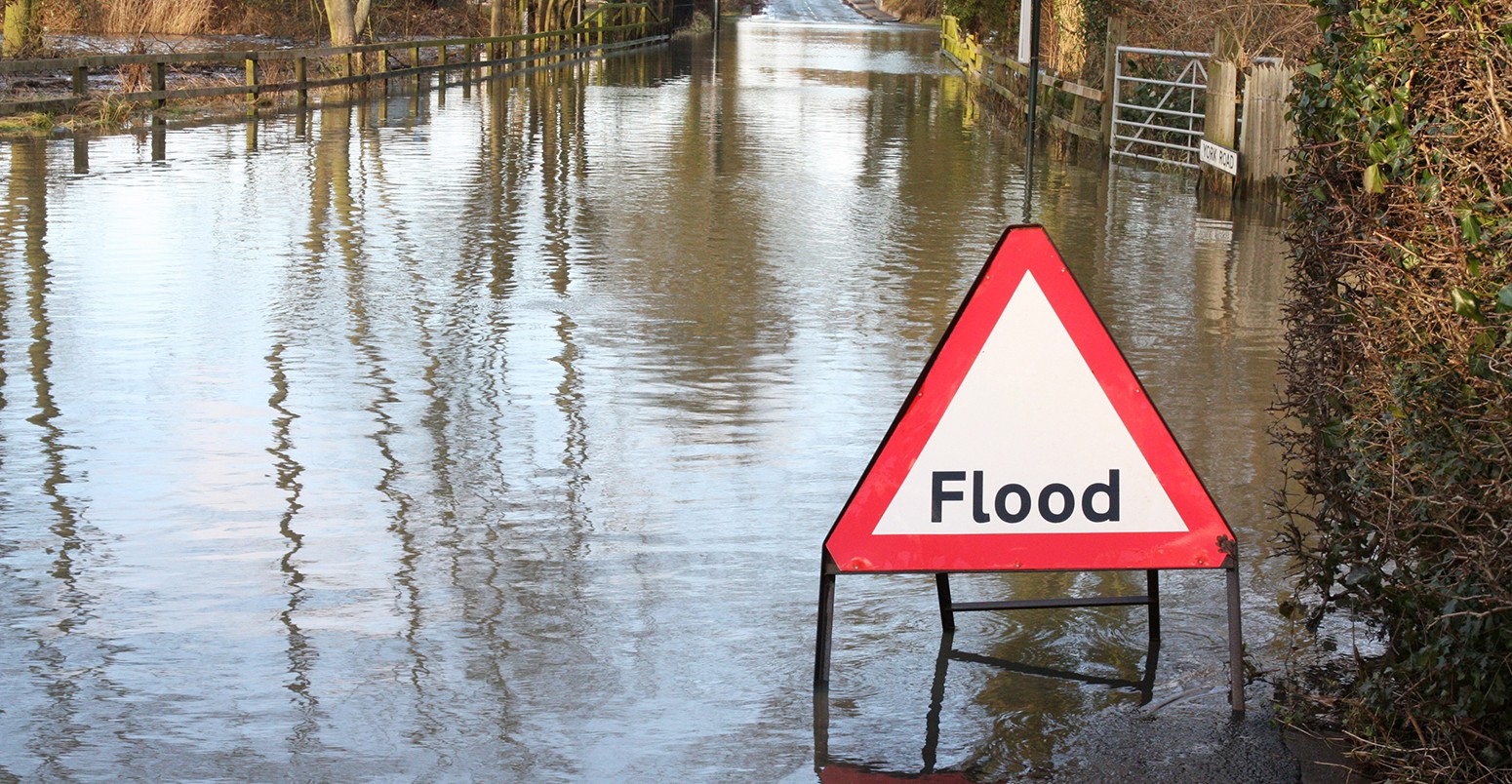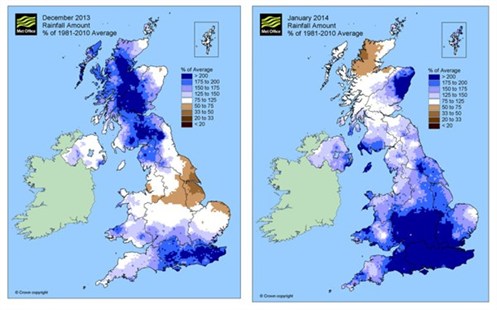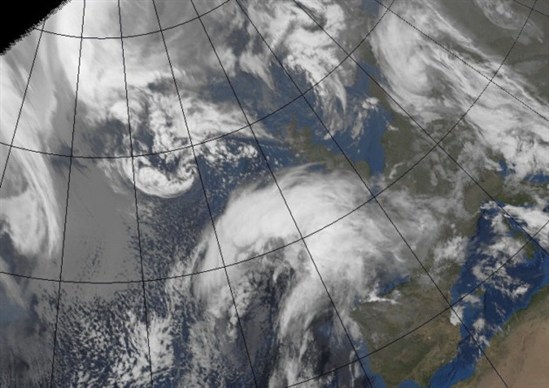
National security and mitigation versus adaptation: Have the floods changed the climate policy debate?
Ros Donald
02.19.14Ros Donald
19.02.2014 | 1:00pmClimate change is back on the front pages – well, one or two anyway – this week as the media, politicians and commentators attempt to make sense of the UK’s recent intense rainfall.
Since before Christmas, the UK has been severely hit by record-breaking rain and winds, and high tides. But the media have been slow to make the connection between the recent extreme weather and climate change. When Carbon Brief first carried out its survey of reporting on the floods, just seven per cent of articles mentioned climate change.
But in the past week, something changed. The volume of coverage mentioning climate change increased to 15 per cent – still a minority of the coverage, but certainly a substantial increase.
More significantly, perhaps, the prominence of these articles became greater. Suddenly, both the opposition leader, Ed Miliband, and economist Lord Stern made the front page of the Guardian, warning that the UK must expect more intense, weather events as the climate warms – and prepare for this new threat to national security. Meanwhile, a counter-attack is mounting, arguing the UK should abandon attempts to cut emissions and focus on adapting to new conditions.

In January, parts of the southern England received more than 200 per cent of the average rainfall for the month. Credit: Met Office
Labour’s climate link
Miliband’s comments are perhaps the most significant to emerge over the course of the flooding crisis, constituting as they do the position of a potential prime minister. The Labour leader is keen to remind voters of the link between scientific predictions of more intense extreme weather and rising global emissions. He calls for a cross-party consensus, not just on shoring up the UK’s capacity to adapt to alterations in the climate, but on cutting emissions and boosting investment in the green economy.
Dr Adam Corner, a research associate at Cardiff University who also works for the Climate Outreach and Information Network, says Miliband’s quotes could help refocus the climate debate:
“If there is a silver lining to the grim winter weather, its that the floods might re-ignite the stale public debate about climate change. Miliband’s intervention was particularly interesting – especially if he makes it an election issue. He linked climate change to national security – one of many ways of reframing the issue away from ‘scientific uncertainty’ or ‘green guilt’ that is urgently needed if the wider public are going to take the issue more seriously.”
Miliband’s comments would not have been so noteworthy a couple of years ago. Despite a long period at the forefront of UK climate policy while Labour was in government, Miliband has been fairly quiet about climate change since his career in opposition began – probably a result of refocusing on party leadership during an economic crisis.
Rhetorically linking the flooding to climate change, then, is a deliberate attempt to appeal to voters who want to see action to tackle climate change. With the opportunity to pick up disillusioned Lib Dem voters who feel the party has let the green agenda slip and push the Conservatives on an area in which they look increasingly weak, the environment could be an election issue.
The coalition on shakier ground
The Conservatives are increasingly divided – not only on the causes of climate change, but over what to do about it. In a recent study, York University’s Professor Neil Carter describes how the cross-party consensus that led to the introduction of the Climate Change Act in 2007 has disintegrated. Within coalition, and especially the Conservative party, climate change has become an increasingly partisan issue.
Indeed, no sooner do coalition ministers make a statement either about the flooding or wider climate policy than they are contradicted by colleagues. When Lib Dem energy secretary Ed Davey criticised climate skepticism within government, Tory energy minister Michael Fallon accused him of “unthinking climate change worship”. And while the Prime Minister has said he suspects climate change has played a part in the flooding, he is increasingly wary of giving a strong government line on the matter.

Credit: Darren Johnson
It’s not clear whether the political point-scoring will go down well with voters. The Times reports a disproportionate number of marginal Tory seats have been hit by the floods, while polling indicates a sharp drop in the number of people who think the government has handled the flood disaster well – a loss of confidence that could hurt the Tories’ and Lib Dems’ chances in the next election.
Public attitudes and the policy debate
Where is public opinion in this? Polling following extreme events in the US suggests peoples’ feeling that they are directly experiencing the effects of climate change has given ‘belief’ that it is happening a palpable boost. But things in the UK seem somewhat different, at least on current evidence.
Polling by Carbon Brief last year suggests just one in seven people in the UK believe climate change isn’t happening. And while there appears to be disagreement over the extent to which human emissions are responsible for warming or extreme weather events like intense rainfall, our results show most people think there will be more floods in future – and most want the government to act to reduce emissions and adapt to new extremes.
Confusion over the link between extreme weather and climate change is hardly surprising given the paucity of coverage that’s explored the relationship. Now, several outlets’ coverage is playing up uncertainty about whether climate change can be blamed specifically for the recent floods.
As polling expert Leo Barasi says:
“The floods probably won’t transform public opinion about climate change. For those of us following the debate closely it feels like a big moment, but for most people climate change is still only part of the background noise.”
Barasi adds that the floods may, however, change the way the media talk about climate change. He says:
“We’ve had four years of tedious debate about whether climate change is real: editors haven’t been interested in much else. But now, there’s an interesting question of the impacts of climate change for the UK. This could become the new focus of the climate debate – which would mean a set of different issues get raised, like whether there’s a trade-off between cutting emissions and adapting to the impacts of climate change.”
The government and opposition both say they are committed both to cutting emissions – also called mitigation policies – and adapting to the effects of climate change.
But other voices have suggested policymakers must choose between adaptation and mitigation. The Telegraph, for example, argues that Miliband’s call to cut emissions shows he is too attached to policies that deliver no “obvious benefits” and could put the country at an economic disadvantage. It argues instead that the country should focus on “practical measures” to prepare for a warming atmosphere. Economist Andrew Lilico argues in the Telegraph:
“[D]o not waste resources on futile mitigation efforts while cutting resources on adaptation. If government budgets are tight and you must choose between subsidies for green energy and money for flood defences, that should be a no-brainer.”
It’s an argument skeptic campaigner Nigel Lawson also made on the Today Programme last week when he argued the UK should stop building new renewable sources of energy and focus on “resilient” infrastructure, including flood defences.
Common ground – and the limits to adaptation
Politicians who support the UK’s plans to cut emissions look set to face continued opposition for the foreseeable future. But Neil Carter points out that on adaptation to a changing climate, the recent comments suggest there’s potential for common ground – even between hardened greens and climate skeptics. Says Carter:
“The fact that people who disagree with acting to cut emissions are now criticising building on the UK’s floodplain suggests there is now more appetite to put in place a serious plan to prepare the country for weather extremes.”
Discussions of adaptation to climate change may soon become more prominent. That will likely be welcomed across the board. But the Intergovernmental Panel on Climate Change (IPCC) predicts temperature rise of up to 4.5 degrees this century if emissions continue unabated. With this temperature rise, scientists expect sea level rise and increasingly severe weather events. By 2025 half of the world’s economic output will be concentrated in countries at “extreme risk” from natural hazards, finds a new report by consultancy Maplecroft.

Satellite imagery of storms on 14 February 2014. Credit: Met Office
An adaptation-only agenda is unlikely to be enough to cushion the UK from the effects of climate change. James Painter at the Reuters Institute for Journalism at Oxford University suggests advocates for for mitigation policy should focus on the risks of unmitigated climate change. He says:
“‘It seems extremely risky to bet that the sceptics who argue we have nothing or little to worry about are right, and that the hundreds of climate scientists who disagree with them are certainly wrong.”
It still remains to be seen whether the media and policy discussion about climate change will shift decisively away from dwelling on uncertainty and toward the impacts we may be able to expect as the climate warms. It also remains to be seen how significant the fight to redraw climate policy as an attempt only to adjust to our new, unpredictable, circumstances becomes.
In just a few weeks, the IPCC will publish the second and third parts of its climate report, covering the impacts of climate change and how governments can cut emissions enough to limit temperature rise. Climate policy is unlikely to become dominated by discussion of adaptation alone, however the legacy of the flooding plays out in climate politics.

